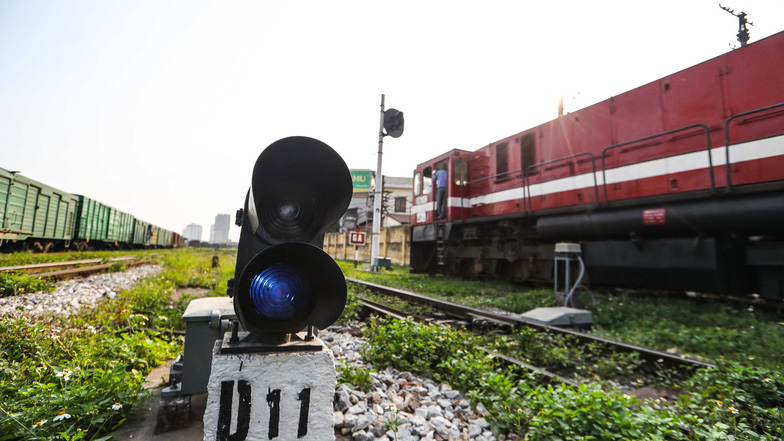An automatic railway signaling system worth over US$300 million installed at several train stations in Vietnam is falling short of expectations, leaving trains susceptible to derailments and collisions.
Railway signaling is a system used to direct railway traffic and keep trains a safe distance from each other by redirecting their paths to avoid collision.
A key element of the signaling system is the “interlocking”, a signal apparatus that decides whether a train will continue on its current track or be redirected, eliminating the risks posed by having two trains on one track.
While this task is traditionally done manually by train station staff, smart interlocking platforms capable of automatically signaling trains to move to specific tracks at junctions or crossings now exist in order to prevent crashes and improve safety.
In 2003, Vietnam’s Ministry of Transport approved a project to install a smart interlocking system along three train routes connecting Hanoi with nearby Lao Cai, Dong Dang, and Thai Nguyen stations. The project came with a VND3.51 trillion (US$233.92 million) price tag, funded by Chinese loans.
In December 2004, the transport ministry gave the go-ahead for a similar system to be installed on the Vinh-Saigon train route. This project’s first phase alone cost VND2.42 trillion ($106.61 million), also financed by loans from China.
The company responsible for installing the interlocking system, known as “6502," was China Railway No. 6 Group Co., Ltd.
Just one year later, Hanoi-Vinh became the fourth train route in Vietnam to have a smart interlocking system installed. The newest interlocking system, known as SSI, was developed by French rail transport firm Alstom at a cost of VND1.08 trillion ($47.58 million).
Despite such massive investments, the automatic interlocking systems were never quite able to live up to expectations, resulting in several near-crash incidents and train derailments.
A series of train derailments were recorded at the Van Dien Station in Hanoi from late 2016 through early 2017.
On July 14, two trains nearly collided when they both entered the same rail track at the Suoi Van Station, part of the Saigon-Vinh route using 6502 interlocking system developed by the China Railway No. 6 Group.
The two trains were heading to Suoi Van in the south-central province of Binh Thuan from opposite directions, yet the interlocking system signaled that both could enter the station via the No. 2 track.
One of the two drivers was able to stop his train in time to prevent a collision. The trains were only 80 meters away from a head-on crash.
 |
| The SSI automatic interlocking system is seen at Giap Bat Station, near Hanoi. Photo: Tuoi Tre |
‘Not problematic’
In April 2017, Vietnam Railways admitted to several safety risks at train stations using the 6502 and SSI interlocking systems.
Following a series of incidents caused by the automatic interlocking platforms, the Vietnam Railway Authority opened an investigation.
By late August, they had concluded that the 6502 system is designed to “receive two incoming trains at a time” – a violation of national safety standards.
Many of the affected stations have since reverted back to manual train signaling in an attempt to restore a measure of safety.
On September 15, the railway authority ruled that relevant agencies will review all issues related to the SSI and 6502 system and report their findings to the transport ministry.
One railway expert has suggested that the investments in the automatic interlock systems, collectively totaling VND7 trillion ($308.37 million), should be reviewed and the exact problems be identified.
However, Doan Duy Hoach, deputy head of Vietnam Railways, told Tuoi Tre (Youth) newspaper on Tuesday that the train signaling systems in question only have “asynchronous, rather than problematic, functioning.”
Hoach refused to give an immediate comment on whether Vietnam Railways has plans to resolve the issue.
Like us on Facebook or follow us on Twitter to get the latest news about Vietnam!


Max: 1500 characters
There are no comments yet. Be the first to comment.